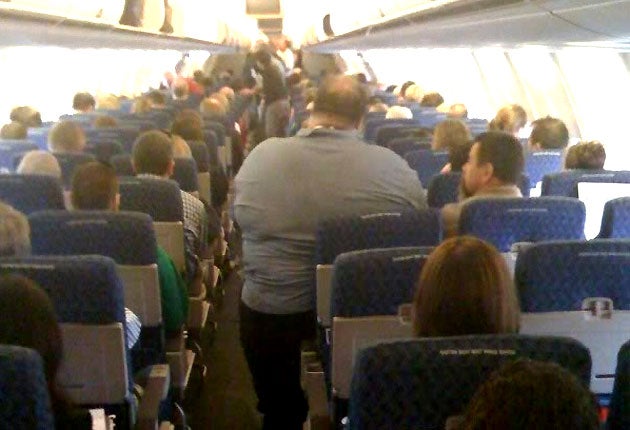Overweight? Then you’ll have to buy two seats
Airlines to penalise obese passengers as bulging waistlines boost fuel consumption

Your support helps us to tell the story
From reproductive rights to climate change to Big Tech, The Independent is on the ground when the story is developing. Whether it's investigating the financials of Elon Musk's pro-Trump PAC or producing our latest documentary, 'The A Word', which shines a light on the American women fighting for reproductive rights, we know how important it is to parse out the facts from the messaging.
At such a critical moment in US history, we need reporters on the ground. Your donation allows us to keep sending journalists to speak to both sides of the story.
The Independent is trusted by Americans across the entire political spectrum. And unlike many other quality news outlets, we choose not to lock Americans out of our reporting and analysis with paywalls. We believe quality journalism should be available to everyone, paid for by those who can afford it.
Your support makes all the difference.With the world’s airlines collectively losing around £10m a day, they are looking closely at the bottom line – of their passengers. In the battle to squeeze maximum earnings from its seats, Air France-KLM will have an explicit policy aimed at obese flyers.
From 1 February, Air France and its Dutch subsidiary, KLM, will insist that “passengers with a high body mass” book a second seat at 75 per cent of the original fare.
The definition of overweight depends on the cabin: in economy class, the airline says its seats are designed for passengers with a waistline up to 135cm (53 inches). If the cabin turns out not to be full, Air France will refund the price of the extra seat.
Obese passengers comprise a growing problem for airlines on three counts. First, with average weight across the population rising, fuel consumption is increased. Next, with more overweight flyers, more passengers experience discomfort from sitting next to them. And with airlines collectively filling a higher proportion of seats, there is literally less room for manoeuvre on board for the cabin crew to shuffle passengers around.
The first airline to address the problem was Southwest Airlines of the US, which now flies more passengers, of all shapes and sizes, than any other airline in the world. The seats aboard its Boeing 737s, though, are one-size-only, and one passenger in 200 cannot fit into them. The airline says: “Our responsibility is to provide safe and comfortable air transportation for each and every customer.” So for the past three decades it has enforced a simple policy for “persons of size”: if a passenger cannot sit in a single seat with both armrests down, they must buy a second ticket. The fare is refunded on any flight that has one or more seats available – which, says Southwest, happens in 98 per cent of cases.
A rival airline, United, has recently declared that passengers in a fully booked economy cabin who cannot buckle the seat belt using a single extender must buy an upgrade on the same flight, or book an extra seat on the next available flight.
UK airlines have traditionally dealt
with the issue on a case-by-case basis. Obese passengers have always been able to book a second seat – indeed, BBC licence fee payers once stumped up for the corporation’s corpulent chairman George Howard to fly to New York on Concorde at twice the normal supersonic fare.
If the pattern of other aviation innovations is followed, other airlines can be expected to follow suit in order to boost earnings. The last seat on an almost-full flight can often be sold at a very high fare to someone desperate to travel.
There is also pressure from some passengers for a passenger and their baggage to be weighed together. Ryanair caused controversy last year when it floated the idea of a “fat tax” on people who “invade the space” of fellow passengers. Even though thousands of Ryanair customers voted online in favour of such a policy, it has not been implemented.
Join our commenting forum
Join thought-provoking conversations, follow other Independent readers and see their replies
Comments